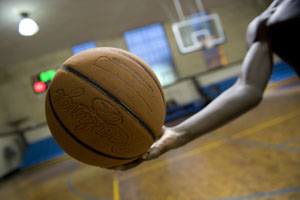A decade on, coaches try to bridge racial divide
By Chip Mitchell

A decade on, coaches try to bridge racial divide
By Chip MitchellMITCHELL: The African American coach is a guy named Christopher Mallette. In 2001, he headed athletics at St. Sabina in Chicago’s Auburn Gresham neighborhood. Mallette wanted to give his flag-football players some tackle experience. And he wanted to give something to St. Sabina players of every sport.
MALLETTE: Exposure.
MITCHELL: The parish had been mostly black since the 1960s.
MALLETTE: We just thought, broaden the horizon of players, also the families involved.
MITCHELL: So Mallette proposed that the school join the Southside Catholic Conference. That was a multisport league for grades five through eight. The league’s schools — there were 21 — they were on the South Side and in a few suburbs nearby. Most of the league’s players were white. But Mallette says he didn’t expect much resistance to St. Sabina joining.
MALLETTE: We had every indication that it was a no-brainer. We were a big parish. No issue paying fees and dues and fielding teams and equipment. We’re ready to roll.
FITZGERALD: There was a pride, saying, ‘Hey, St. Sabina wants to join our league.’
MITCHELL: Tom Fitzgerald is the white coach. He headed athletics at St. Linus in Oak Lawn, a suburb 15 miles away. That parish included some families who lived near St. Sabina before the neighborhood turned black.
FITZGERALD: People were saying, ‘Oh, that’s great.’ You felt like, ‘This was the parish that we lived in when we were kids.’ I thought it was kind of contagious.
MITCHELL: But it wasn’t.
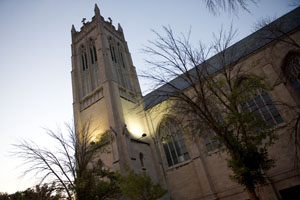
FITZGERALD: I can’t identify the source. I can tell you that I did see some unofficial police reports of the crime rate over there in the St. Sabina neighborhood. And they showed some numbers — between assaults, robberies — and people are getting nervous now, saying, ‘Well, we’re not sending our wives and kids over there’ — really concerned for their safety.
MITCHELL: League officials voted 11 to 9 against allowing St. Sabina to join. Fitzgerald cast one of the votes to keep the parish out.
FITZGERALD: My explanation and rationale behind my vote was that I would not tell people that we would go over to St. Sabina and play and then not show up. To me, that’s wrong. And when the vote came in for no the floodgates opened. I could not believe the amount media attention that this received.
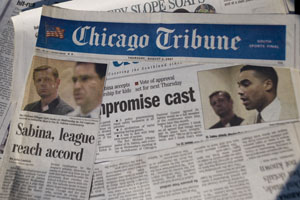
MALLETTE: If your real concern was crime, the crime that was occurring was black-on-black crime. There were no people waiting in their lair here, to jump out of their lair, and rob the families that were coming to play a basketball game.
FITZGERALD: I honestly felt people would go over there, once the ice was broken. I know how good the people from this neighborhood are — how genuine and sincere they are. We could have weaned ourselves into a very healthy relationship. But when you force people to go over there, you’re going to get resistance.
MITCHELL: St. Sabina rejected the compromise offers. Here’s Mallette.
MALLETTE: I actually had coaches and athletic directors from other SCC schools, point blank, say, ‘This is about race.’ And they saw our entrance into the Southside Catholic Conference as an invasion, if you will, of their feeder program to the schools they traditionally went to. I had a coach tell me, ‘I think you’re a good guy but you got to understand, at the end of the day, we would rather have Jimmy playing quarterback — at St. Lawrence or Brother Rice or Marist or wherever — than Jermaine.’
FITZGERALD: I said the only way I would consider changing our vote after we had talked about it is if the cardinal called me — jokingly I said that. Next day, the cardinal calls me at home. I have really put myself in a predicament there.
MITCHELL: The league reversed itself and let St. Sabina in. Many schools gave a warm welcome. But there were flare-ups. At one game, some white parents had it out with St. Sabina’s pastor. He’s an outspoken white priest named Michael Pfleger. After another game, a St. Sabina player accused a kid on the other team of calling him the N-word. And there was the handshake incident. Fitzgerald says Mallette had refused to shake his hand after a league meeting months earlier.
FITZGERALD: I’m just there, like, ‘You know Chris? Two can play this game.’
MITCHELL: Fitzgerald waited until the two faced off as basketball coaches and the game ended.
MALLETTE: You greet the opposite coach.
FITZGERALD: A handshake is just a sign of respect.
MALLETTE: You joke back and forth a little bit.
FITZGERALD: It’s just truly about sportsmanship.
MALLETTE: It’s just part of the fraternity of coaches and part of what you do.
FITZGERALD: I was the last one in line. I shook all the kids’ hands. I shook his assistant coach’s hand. And he extended his hand. I just went up to him, kind of got close, put my hand on his shoulder. I congratulated him about a good game but I refused to shake his hand.
MALLETTE: And I called, ‘Coach! Coach!’ I think he looked over his shoulder and kept going.
FITZGERALD: I made sure that I did not make a spectacle out of it.
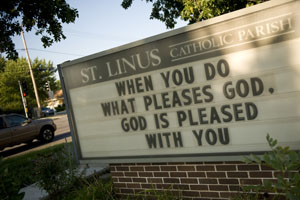
MITCHELL: The St. Sabina parents eventually decided they’d had enough. Just before the playoffs, they voted to pull their school out of the league. They said it was a matter of protecting their integrity. But the whole experience left Fitzgerald feeling burned.
FITZGERALD: I’ll tell you, the people who know me and the people I represented backed me up. And that meant more to me than anything else.
MITCHELL: He dabs his eyes.
FITZGERALD: You know, I’m not a racist. And I’m just like, ‘God, that’s just mean.’ Discrimination is not right. Being a racist isn’t right. But I’m being accused of something that I’m furthest from being. And that bothered me.
MITCHELL: Despite the feelings, the coaches never saw fit to speak with each other about why they didn’t shake hands — and about why the effort to put St. Sabina in the Southside Catholic Conference failed. More than 10 years passed. This summer we invited them to sit down together.
MITCHELL (on scene): Thanks so much to both of you for agreeing to talk.
MITCHELL: The conversation lasted almost two hours. Christopher Mallette said his players — the St. Sabina kids — he said they learned something from playing the white teams that season.
MALLETTE: None of our kids could sincerely say they could brand the South Side Irish as racist because they met so many good coaches, so many good parents, principals, nuns, priests. There was an exposure there. You can’t stereotype any longer.
FITZGERALD: There had to have been a way to make this work .
MITCHELL: Tom Fitzgerald said race was never the issue for his Oak Lawn parish.
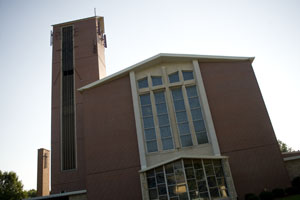
MALLETTE: I think what hurt St. Sabina most deeply was that so few, if any, or no people from other parishes who stood up and said, ‘You know what? We’re standing with you here.’ And there’s also a sense of nostalgia, I think.
FITZGERALD: My parents, I mean, there are people my age who had their first few years of grade school at St. Sabina.
MALLETTE: Yeah.
FITZGERALD: That whole area over there.
MALLETTE: And, if you even look at where the South Side Irish Parade began, it began at St. Sabina.
FITZGERALD: Over on 79th Street.
MALLETTE: And it went down 79th Street. But you also look at white flight. And when white flight took place and a lot of the South Side folks moved out of those parish communities and moved a little bit further south, a little bit further west. And, at that time, the adults and coaches were kids. They were the kids around the table.
FITZGERALD: That’s where I was born.
MALLETTE: Yeah, ‘Why are we moving?’ And you’re told, ‘Crime.’ And the only thing that you see is black people moving in so, psychologically, you equate black people with crime.
FITZGERALD: Generically I will agree with that comment but it depends upon how you were brought up too.
MITCHELL: Mallette told Fitzgerald the white schools weren’t the only ones worried about safety.
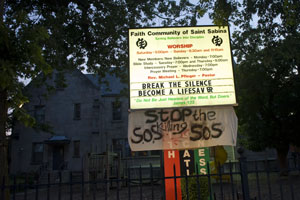
MITCHELL: Mallette also talked about what it was like for St. Sabina people to travel to a white parish.
MALLETTE: We actually got pulled over, we actually got racially profiled, going to a meeting with the athletic board. And that was the one thing I had mentioned and everyone had laughed and shrugged off, ‘That will never happen.’ And it was a meeting to talk about our kid being called the N-word at a basketball game. And here you get pulled over and you have citizens come out of their homes, cheering the police on. While myself, the father, the mother and the 13-year-old kid are spread eagle with their hands on the trunk of a car, trying to find this meeting place.FITZGERALD: That’s wrong. I didn’t walk in your shoes. For everything that you went through that year, those were shoes that were probably very difficult to walk in.MITCHELL: I brought up what happened between the two men on that basketball court — the handshake that didn’t happen. Fitzgerald pointed to Mallette’s slight from months earlier. Mallette said he didn’t remember it.MALLETTE: If I did shun you there, Tom, I apologize. That shouldn’t have happened.
